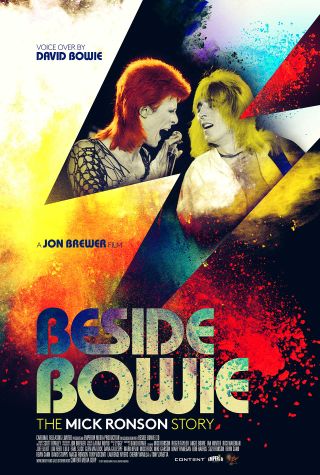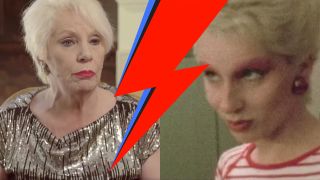A beaming, brassy blonde vision in the most scandalously scarlet of lipsticks, Angie Bowie effortlessly surpasses the epithet larger-than-life. Every word is projected into the rafters with theatrical largesse, steely blue eyes pierce, the charisma is set to stun, the glamour scintillating. Angie’s here in London’s Mayfair – where else? - to eulogise Mick Ronson.
The late guitarist, rendered iconic by his association with Angie’s ex-husband David, is the subject of Beside Bowie, an engaging new documentary from director, and former Bowie associate, Jon Brewer. Angie (who is interviewed in the movie alongside, amongst others, Lou Reed, Ian Hunter, Joe Elliott and Roger Taylor) pulls no punches. So strap yourself in, as one of rock’s sassiest muses honours a solemn promise made in a monochrome pre-glam 1970.
How did you and David meet?
I met David in London in 1967, seeing him at The Roundhouse with Calvin Mark Lee and Lou Reizner from Mercury Records. Calvin wanted to sign him, Lou didn’t, so Calvin said ‘Persuade the guys at Mercury we should sign him.’ So I did.
Nicely done
Yes, that’s what I thought.
What motivated the decision to place David’s acoustic material in a rock setting?
We played a gig in Gravesend [The General Gordon, 31st November, 69], and David had bottles and cigarettes thrown at him. I picked up a bottle and went after the person who threw the cigarette. Now, a great gal, Cheryl something, was also on that night and said, ‘David, use my band and do some of the tunes I heard you do with The Manish Boys.’ Which was his band before he was punting himself as a folk singer.
He was doing the folk thing because at The Three Tuns, where we held Beckenham Arts Lab, you couldn’t have much amplification because of the neighbours. So after Gravesend we wondered if it might be time to change course, not be so focussed on being a folk singer and be more open to having a band, because, number one, he had a good time playing with the band that night, number two, they saved his ass, and number three, if we’re going to the big-time, I can’t be running around attacking people who throw cigarettes at him with bottles, I’ll get arrested.
How did Mick Ronson enter the equation?
Tony Visconti was sharing Haddon Hall with us and Tony’s an ace bass player. Our fabulous roadie Roger Fry brought John Cambridge down from Hull to play drums who said, ‘There’s a fabulous lead guitarist in Hull called Mick Ronson who’s in a band called The Rats. We went up to Mick’s house in Hull, but he was at work, so we were talking with his mum, Minnie. When Ronno got home the first thing he did was go straight to his room and put a fresh shirt on. He had his sleeves folded up, not rolled, French cuffs, so I said, ‘Minnie, I can only tell you that I’ll take care of him. I’m a great cook. I’ll make sure he eats and I’ll iron his shirts.’ So we went to The Gainsborough for skate and chips and David said to Ronno, ‘I’ve got another album to do and I’m looking for a lead guitarist’.
They played at The Hampstead Country Club and myself and Susie Frost, who watched our son Zowie when he was born, made costumes. I’m from theatre, so I knew they had to look slick and Ronno, in a weird-cut, gold lamé suit, looked wonderful, like a blond Elvis.
John Cambridge left and Visconti had big-paying production commitments, so Ronno said, ‘I had some good guys in The Rats.’ So Trevor Bolder and Mick Woodmansey came down, lived on the Haddon Hall balcony with Ronno, and we had a rock ‘n’ roll band.
Then came the haircut
All that fuzzy stuff had to go and while it’s easy to jump in and take credit, it was’t my idea. I had been hinting, but one day David said that maybe it’d be an idea to slick it up a little to be more recognisable. And his hair, which was very permed, curly and blonde, looked very hippy-esque. You’ve got to pick your battles and seeing how there was already Bob Dylan and Donovan, competing with them would have been stupid.
Mick Ronson rapidly developed into much more than just a lead guitarist
Just after Ziggy Stardust was recorded Mick said that he wanted to learn to arrange like Tony Visconti. So I said, ‘Damned fine idea’. You’ve got to remember the promise I made to his mother, I was always totally and utterly behind Mick doing whatever he needed to do to make him happy or to be a successful musician. So he went back to Hull, taught himself to arrange and the result was Lou Reed’s incredibly brilliant Transformer album.
The well-worn record shows David and The Spiders moved like tigers on Vaseline from the success of Ziggy Stardust to hitting the buffers on July 3rd, 1973
The band was dismissed at The Hammersmith Odeon by Tony DeFries [Bowie’s manager from ‘70-‘75]. That day was not a happy time. I brought in Tony DeFries to get rid of Ken Pitt [Bowie’s manager from ‘67-‘70]. DeFries got illusions of grandeur, set up Mainman and expected to pay for it with David’s sweat. By then David was in between a rock and a hard place, he felt his future lay with this crazy lawyer-turned-rock manager and just agreed [to sacking the band]. He didn’t consult me. That was his first sin; I didn’t trust him after that. I thought he’d have at least told me, seeing as how I’d promised Minnie I’d look after Mick.
Jon Brewer’s movie contextualises how Mick Ronson passed through the horror of Tony DeFries and moved onto find himself, to work with Lou Reed, Mott The Hoople, Bob Dylan and Morrissey, to spot and record new talent. I’m so happy he had the opportunity to do all those things, but how could anyone die so young? 46-years old, it makes you want to burst into tears.
- Mick Ronson: Hull's Guitar God
- Mick Ronson: the legend behind David Bowie - in the new issue of Classic Rock
- David Bowie’s Ziggy Stardust preserved for posterity
- Read Classic Rock, Metal Hammer & Prog for free with TeamRock+
Mick wasn’t invited to be on Diamond Dogs. Was he too charismatic for his own good? Did David feel there was only room for one star on-stage as he continued to establish himself?
David was fucking gutted. He’d gotten rid of Mick and now he was going to ask him back to do Diamond Dogs? Mick Ronson would tell him to go fuck himself. David would’ve had him back in a quick minute, you can’t have too many stars on-stage. It was Tony DeFries fed that in his ear. And he had that sick-ass Mike Garson on piano, that scientologist human. I said, ‘You’re dancing with the devil. You really don’t care, do you?’ I was still furious about them being fired. That’s another reason David didn’t want me to have anything to do with his business anymore, because my wrath is not something you want to experience. Tony DeFries might get cranky, I could say things that get you to the core. And I was mad. He’d made me look an idiot to Mrs Ronson and you don’t do that to me.
That promise you made to Mick’s mother seems to be at the core of everything here
It is, to be honest with you, because I can’t forgive. And do you want to hear something else David did I never forgave him for? Coming to Victoria Station in a Mercedes Landau and giving a Hitler salute. My father was a war hero, he was in The Philippines for three years carried on a stretcher with malaria through the mountains of Northern Luzon, and you’re going to make a joke about England needing a fascist dictator to get back on its feet? The door closed that day, baby. I was done. I don’t think we spent a night in the house together after that. I wouldn’t tolerate it. If he came to town I left: ‘Gotta go to LA, gotta go to New York, sorry babe’.
How do you feel about David having been almost sanctified since his passing?
It’s a joke… Just bollocks. It’s like when people join a religion. They get tunnel vision. They hear an artist, they think they own him. He could never have done anything wrong, could never have been anything but perfect. They get on a roll and start thinking that he’s close to God, baby. He could be his stand-in. No, he’s just another dude trying to make a buck.
Beside Bowie will be shown on Sky Arts on Saturday May 27 as part of the Sky Arts Rocks series.

We did the maths on rock star deaths and the answer is grim…


